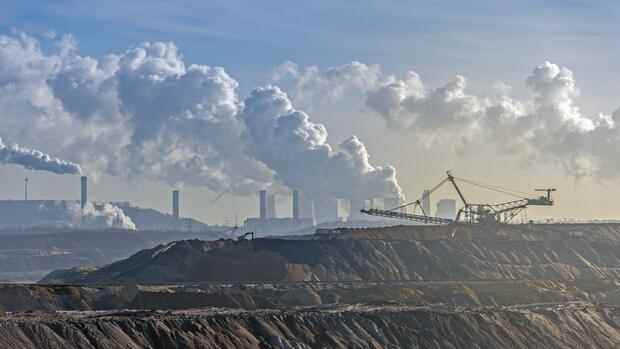Climate protectors are calling for an end to coal mining, and security of supply is a priority for the NRW state government.
(Photo: Imago / Westend61)
Dusseldorf The new North Rhine-Westphalian Prime Minister Hendrik Wüst wants to phase out coal in North Rhine-Westphalia as early as 2030.
“In North Rhine-Westphalia we are ready to phase out coal as early as 2030 and want to do everything we can to ensure that we succeed,” said Wüst in his government statement on Wednesday in the state parliament in Düsseldorf, according to the speech.
But coal must be made superfluous as an energy source. This includes a rapid expansion of renewable energies. He therefore also expects clarity from a new federal government, said the CDU politician.
The grand coalition had decided that the last German coal-fired power plant should go offline by 2038 at the latest. The traffic light parties SPD, Greens and FDP declared in their exploratory paper for a new federal government, however, that an accelerated phase-out of coal-fired power generation is necessary to meet the climate protection goals.
Top jobs of the day
Find the best jobs now and
be notified by email.
“Ideally, this will be successful by 2030,” said the exploratory paper. In North Rhine-Westphalia, the utility RWE with its lignite opencast mines would be affected by decisions for a faster exit.
Wüst’s predecessor Armin Laschet (CDU) also recently signaled for the first time that an earlier exit from lignite was possible. If the federal government makes a new decision to end lignite generation more quickly, NRW should be prepared, Laschet said in October at a state party conference of the NRW CDU in Bielefeld.
The lead decision of the black and yellow state government on lignite already includes the possibility that villages that, according to the previous plans, would fall victim to the lignite excavators, could then be preserved, said Laschet. The decisive criterion is whether security of supply can be maintained.
Aid for coal regions is starting
Meanwhile, federal aid for the regions affected by the coal phase-out is starting. So far, seven projects with a volume of 80.5 million have been started within the framework of the financial aid, according to a report by the managing minister of economics Peter Altmaier (CDU) for the federal cabinet. A total of 175 projects with a volume of 3.01 billion euros have been confirmed.
In order to help the coal fields in East Germany and North Rhine-Westphalia with the change, up to 40 billion euros are to flow. The federal government alone wants to create 5,000 jobs in the regions by 2028 by relocating all or part of the authorities. According to the report, 2140 positions are already filled.
Altmaier sees the start of the aid as a success. A distinction is made between financial aid (14 billion euros) and structural aid (26 billion euros) for the auxiliary pots for the districts. The report shows the planning status and usage until the end of August.
Of the financial aid planned up to then, 1.183 billion euros are to flow into the Lausitz area in Brandenburg and 498 million euros into the Lausitz area in Saxony. For the Central German district in Saxony, 336 million euros were planned and for the Central German district in Saxony-Anhalt 805 million euros. For the Rheinische Revier it was 191 million euros. The seven projects that have already started can only be found in Saxony.
More: The gas illusion: why fewer gas power plants don’t mean more climate protection
